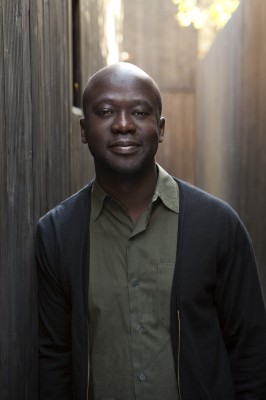Colgate University has partnered with David Adjaye, one of the world’s leading architects, to begin the design process for a new art and cultural center envisioned for the Village of Hamilton. In this initial phase of the project, Adjaye will meet with members of the community and study the proposed space. He will articulate a vision for the scope and scale of the structure and create a schematic design and budget that can be used for future planning discussions with the village, as well as fundraising.
Adjaye Associates is an internationally acclaimed practice with extensive experience in creating unique cultural spaces around the world. It was chosen from among 12 firms that responded to Colgate’s request for proposal (RFP), which called for “a distinctive and stirring architectural solution” for 18-20 Utica Street, the former site of Parry’s Hardware, a building now owned by the Hamilton Initiative.
The Colgate University Center for Art and Culture (CAC) would be a visible and public extension of the university’s commitment to the arts. The RFP outlined the CAC as a flexible space accommodating a wide range of activities and audiences, with the potential to become a “transformative force in the university and the village of Hamilton.” Collections from Colgate’s Picker Art Gallery and Longyear Museum of Anthropology would be relocated to the new space.
Adjaye is renowned for his artistic sensibility and passion for collaboration and interdisciplinary dialogue. With offices in London, Berlin, and New York, he has been commissioned for prestigious residential, commercial, and educational projects in Africa, Europe, the Middle East, and elsewhere in the world. Presently, he is lead architect of the Freelon Adjaye Bond team for the new Smithsonian National Museum of African American Culture and History, which is scheduled to open in 2015 on the National Mall in Washington, D.C. He is also working on a neighborhood of several city blocks in Doha, Qatar, and an urban revitalization project integrating affordable housing, education, and cultural resources in Harlem’s Sugar Hill neighborhood.
For Adjaye’s firm, the Colgate project is appealingly “mid-scale,” much like the Bellevue and Francis Gregory public libraries he designed in Washington, D.C. Those projects, which have been called “inviting and engaging” and “sure to transform the communities they reside in,” were of particular interest to the committee that selected Adjaye from among the four firms they invited to campus to present their credentials.
“It was not just Adjaye’s significant talent and experience, but also his sensibilities about the importance of the surrounding environment and the impact his buildings can make on the people of a community, that led us to enthusiastic support of his selection,” said David Hale, Colgate’s vice president for finance and administration.
Adjaye said: “What is important to me about this scale of project is that it allows me to make very special, jewel-like buildings. I really love being able to engage the community, to talk about sustainability, to talk about creativity, to talk about innovation, outreach, and education.”
On a recent visit to Hamilton, Adjaye said that architecture, for him, is about two things: people and light. “To understand people’s interpretations — of home, public, civic, rural, urban spaces — has been fascinating because it’s different everywhere. And it’s also about light: the discourse of light is absolutely different to each latitude and longitude.”
In the coming months, Adjaye said he will research the angles and the colors of the light. “We do that scientifically,” he said, “but I also visit the site in different light conditions. I need to understand how people use the light that’s available to them in their day, and how they use their day.”
For Adjaye, who started his practice in foggy, grey London, Hamilton seemed ideal. “I spent a lot of time explaining to Londoners that there’s not a lack of light; it’s just a very different kind of light. Here in Hamilton, it’s luminescent.”

